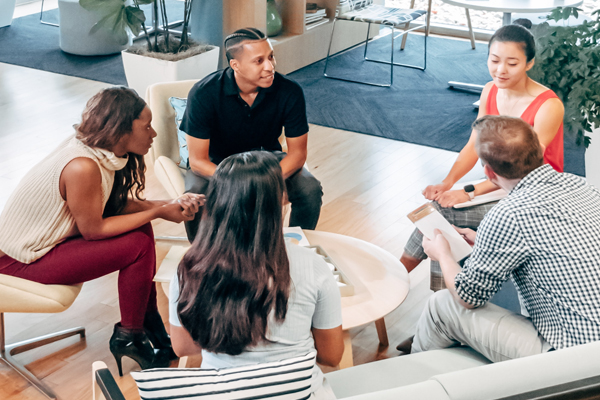The UK’s Race Equality Week 2022 has launched the #MyNameIs Campaign with a new tool to drive greater inclusivity in workplaces.
Mispronunciation of people’s names happens every day and everywhere. But according to Race Equality Matters (REM), organiser of Race Equality Week, this can often have a negative impact on inclusivity in the workplace; particularly for those from minoritised ethnicities. So, to raise awareness of this problem and also provide a solution, REM has launched the #MyNameIs ’Fuh-Net-Ic Filter’. The campaign marks the start of UK’s second ever Race Equality Week (7-13 February 2022), as reported.
The Fuh-net-ic Filter is aneasy-to-use tool that allows people to get the phonetic spelling of their name; and share it on social media with a fun and engaging piece of content. They simply go to the my-name-is.io website and then type their name to get a phonetic translation with the #MyNameIs hashtag. There’s also an option to upload their photo. Once this is done, they can download the image, share on social media or even drop into email signatures, business cards; or any other place where people will see their name.
The phonetic spellings are sourced from NameShouts; which holds over half a million names, including multiple pronunciations of some so you can select the one that works for you. The tool also has an audio version of the name to aid pronunciation. Individuals whose names are not already in the tool can type their own name and add to this growing community and valuable source of phonetic name translations. In doing so, they’ll help others who are seeking phonetic spellings of their names.

ALLYSHIP & SUPPORT
“Many in our REM community have said that their names are mispronounced at work. Some found it disrespectful or upsetting; while others said it affected their sense of belonging,” stated Javed Thomas, Managing Director at Collaboratory, one of the founding members of REM. “While the issue is likely to be more prevalent amongst minoritised ethnicities with non-British names, it’s something most of us can understand or empathise with. As everyone’s name is part of their heritage, their pride and identity. That’s why this Fuh-ne-tic Filter is open to everyone. It gives a voice to those who are impacted by mispronunciation and beyond this to others who want to show allyship and support for greater inclusivity in the workplace.”
Race Equality Matters membership includes thousands of organisations striving for racial equality in the workplace, which, despite continued action, remains a challenge in the country. For example, in its recent Business Leaders Index, REM founding member Green Park revealed that the top three roles of the FTSE 100 organisations have failed to improve ethnic diversity.
CREATING MEANINGFUL ACTION
According to Raj Tulsiani, CEO at Green Park, “With only 11 ethnic minority Chairs, CEOs and CFOs, there is still a long road ahead for many organisations that want to create more diverse and inclusive workplaces. But while the problem can seem quite complex, there are often simple actions that can be done to help create the culture for change. Taking a moment to understand how to correctly pronounce a colleague’s name can go a long way towards this. During Race Equality Week, the Fuh-ne-tic filter will help achieve just that; and point to a range or resources dedicated to those who want to improve workplace inclusivity.”
A UK-wide initiative, Race Equality Week was launched by REM to turn words into meaningful action; a movement spurred on by the events of 2020, which have heightened the country’s collective consciousness of the racism, inequality and injustice experienced by minoritised communities. Over 2,000 organisations participated in the inaugural Race Equality Week in 2021 with a further 1,000 set to join in 2022. Around 500 organisations have already adopted the MyNameIs Guide, confirmed REM.
CAMPAIGN SUPPORTERS
Supporters of the campaign includeGovia Thameslink Railway, Transport for Wales, Mental Health First Aid England, and Connected Voice. “I’m supporting this campaign to save us all from that excruciating moment where someone freaks out and starts adding lots of i’s and e’s into my name, and we both feel like we want to die,” said Farzana Hakim (Fer-zar-nar Hak-Eem), Head of Public Affairs at Govia Thameslink Railway. “I pronounce things wrong all the time, but it doesn’t scare me and I make the effort to learn. If I can make it easier for other people then I’m happy to do that. And it helps having a name that rhymes with a popular fruit.”
Connected Voices’s Support and Development Officer Sara Chezari (Sah-rah Chees-ah-ree) also joined the campaign. She said her name both closed and opened doors for her; and also it “been a source of shame and othering and equally my sense of identity and individuality”. “The #MyNameIs campaign has helped me to reclaim it and I now say it more proudly,” she confirmed.
“Names are not just names. Our names are attached to a deep routed meaning of heritage, family legacy, history, and faith,” pointed out Ama Afrifa-Tchie (Ah-ma A-free-fa Chee), Head of People, Wellbeing & Equity at Mental Health First Aid England. “For those who come from different cultural backgrounds and nationalities, their names are an intrinsic part of who they are and form their identity. Our names are often the first thing we share when we meet people. People should be more proactive in learning how to pronounce people’s names whether it’s their first name or surname and make the effort to learn. There is still a lot more work that can be done to challenge this. However, if in doubt, just ask for the correct pronunciation rather than attempt to say it which often leads to awkward and uncomfortable moments.”
For Inein Victor Garrick (In-ehh Vick-tor Gar-ick), Safety Inspector at Transport for Wales, the campaign has given him the strength and voice to face his own personal challenges with his name being mispronounced in the past. “This is one of the many microaggressions people face not just in the workplace but also in society and we need to as a society proactively support those affected by being respectful and being an ally,” he pointed out. “If we want to live in a society that truly values dignity, respect and inclusion; then this is something we must address by starting off with something as effective as respecting and valuing people’s names and most importantly the cultural heritage attached to their names. I would love people to be inspired be who they are. My hope and belief is that this campaign can inspire bravery in that sense.”
Click here to read more about why the #MyNameIs initiative was launched and why employers should back it.







































